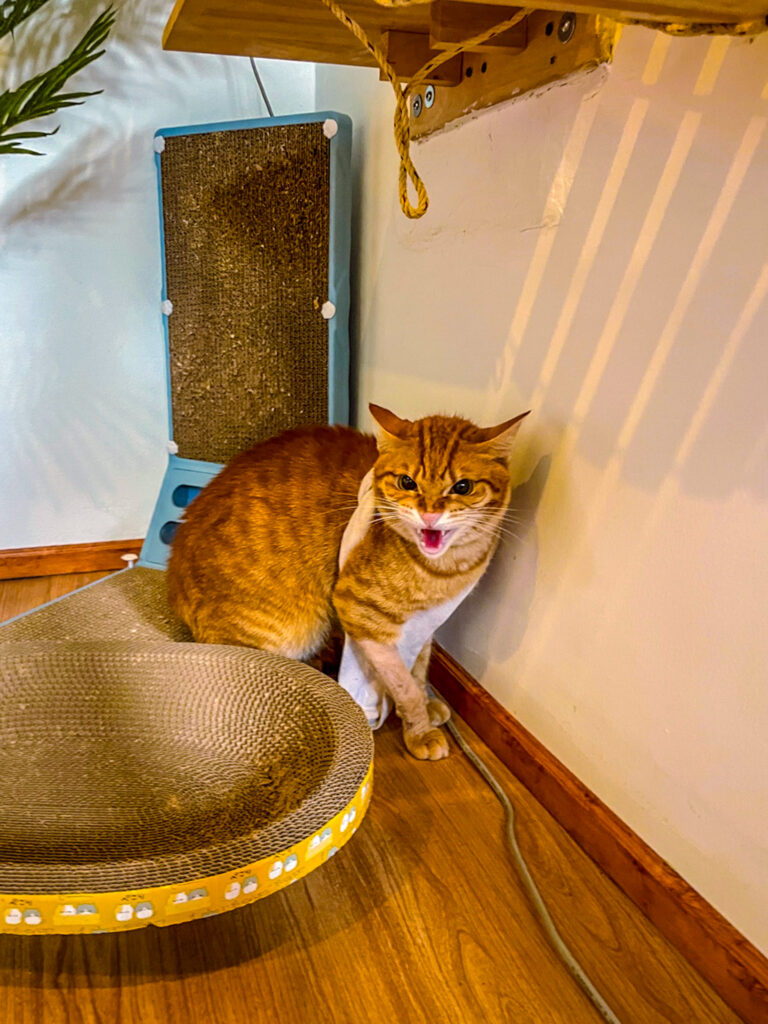Stress in cats is more common than many owners realize. Just like humans, cats can feel anxious, overwhelmed, or unsettled by changes in their environment. Unlike us, however, they can’t explain their feelings with words. Instead, they show subtle (and sometimes dramatic) changes in behavior and health.
If left unchecked, chronic stress in cats can lead to urinary issues, hair loss, digestive problems, and even life-threatening conditions. Recognizing early symptoms and providing solutions can help your cat feel safe, happy, and secure.
What Causes Stress in Cats?
Anxiety in cats often comes from:
- Environmental changes: Moving house, new furniture, or rearranged spaces.
- Social stress: The arrival of a new pet, baby, or house guest.
- Medical issues: Pain or illness may trigger anxiety.
- Boredom or lack of stimulation: Cats need entertainment and routine. (check the best cat toys)
- Travel and confinement: Car rides, vet visits, or stays in unfamiliar places.
Understanding the causes helps owners prevent and treat stress more effectively.
10 Common Signs of Stress in Cats
- Urinating Outside the Litter Box
A top sign of stress is inappropriate urination. It can also indicate urinary infections, so always consult a vet. - Changes in Appetite
Eating significantly more or less than usual often signals emotional distress or medical problems. - Excessive Hiding
While cats value solitude, sudden isolation or avoidance of family members can reveal anxiety. - Excessive Grooming or Hair Loss
Stress in cats may show as over-grooming, bald patches, or skin irritation. - Aggression
Unexplained hissing, biting, or attacking other pets is a physical sign of anxiety. - Digestive Upset
Stress in cats can cause diarrhea, constipation, or vomiting unrelated to diet. - Increased Vocalization
Loud or constant meowing, yowling, or howling may point to chronic stress. - Sleep Pattern Changes
Sleeping far more—or far less—than usual can be linked to stress in cats. - Attention-Seeking Behavior
Sudden clinginess or constant demands for affection often signal anxiety. - Excessive Scratching
Cats under stress may scratch furniture, doors, or even themselves more often.
How to Relieve Anxiety in Cats
- Provide a Safe Space
Create a quiet retreat with bedding, toys, and water where your cat feels secure. - Maintain Routine
Consistency in feeding, cleaning, and play reduces stress in cats by providing predictability. - Interactive Play
Regular playtime relieves pent-up energy and mimics hunting instincts. Laser pointers, feather wands, and puzzle feeders can calm anxiety. - Environmental Enrichment
Scratching posts, perches, cat trees, and hiding boxes help reduce stress in cats by giving them stimulation. - Nutrition & Hydration
A balanced diet supports overall health, which lowers stress risks. Some calming diets or supplements may help. - Catnip or Calming Aids
For some cats, catnip provides short-term stress relief. Others may benefit from pheromone diffusers or calming sprays. - Veterinary Support
If stress in cats is chronic or severe, a vet can rule out illness and suggest treatments, including medication if necessary.
FAQs About Stress in Cats
Q1: Can cats die from stress?
Yes, in extreme cases, untreated stress in cats can weaken the immune system, cause urinary blockages, or worsen existing health conditions. Always address severe stress quickly.
Q2: Do cats need to be entertained?
Absolutely. Boredom is one of the leading causes of stress in cats. Interactive toys, scratching posts, and daily play keep them mentally and physically engaged.
Q3: How much playtime do cats need to reduce stress?
Most cats benefit from at least two 15-minute play sessions daily. Kittens may need more, while older cats may prefer shorter, gentler interactions.
Q4: Does catnip relieve stress in cats?
For many cats, yes. Catnip can provide a playful, calming release. However, not all cats respond, and some may become overstimulated.
Q5: What causes chronic stress in cats?
Chronic stress often develops from ongoing conflict with other pets, constant loud noises, lack of hiding spaces, or untreated medical conditions.
Final thoughts
Understanding the signs of stress in cats and responding early is one of the best ways to protect their health and happiness. Whether it’s providing safe spaces, keeping a routine, or seeking veterinary help, small consistent actions can dramatically improve your cat’s well-being.
By addressing their anxiety with care and attention, you ensure your feline companion enjoys a longer, calmer, and more fulfilling life.







